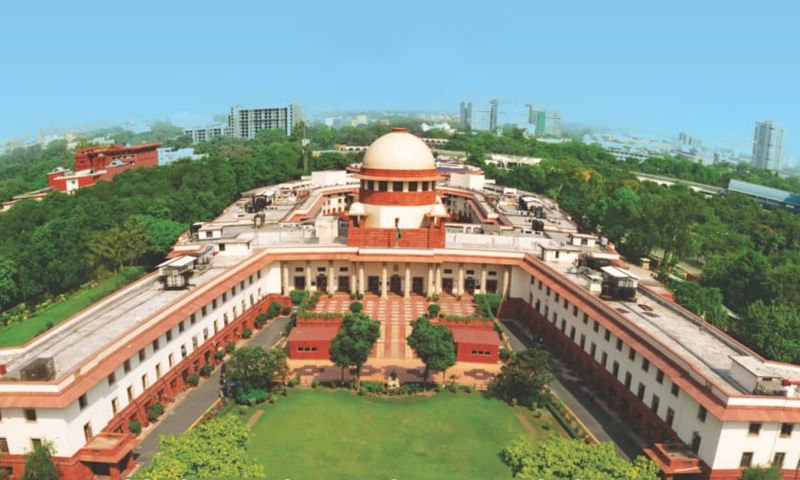“All current cases, appeals, and processes with respect to charges lodged for sedition shall be placed in abeyance,” the Supreme Court stated on Wednesday, asking the Centre and states to desist from filing any FIR mentioning sedition allegations till additional re-examination is completed.
Earlier in the hearing, the Centre requested that the registration of FIRs for sedition be overseen by a superintendent of police rated officer.
The Supreme Court on Wednesday placed on hold a 152-year-old colonial-era sedition statute, emphasising the importance of preserving individuals’ fundamental liberties. This occurred a day after the Supreme Court gave the Centre 24 hours to consider whether Section 124A of the Indian Penal Code (IPC) may be placed on hold “to safeguard citizens” from arrests while the government evaluates the law.
In an interim ruling, a bench led by Chief Justice of India NV Ramana said it would be prudent to put the provision on hold while the Centre considers the non-bailable part, which carries a sentence of three years to life in prison.
“Until additional re-examination is completed, it will be advisable not to employ this provision of legislation.” “We hope and expect the Centre and states to refrain from filing any FIRs or initiating proceedings under Section 124A till the re-examination is completed,” said the bench, which also included justices Surya Kant and Hima Kohli.
The court stated that persons who have been imprisoned or are being prosecuted can approach the trial courts to have their issues resolved quickly. It turned down the Centre’s appeal to halt the provision’s implementation. Following multiple instances of legal misuse, the court stated that it must strike a balance between civil liberty and state sovereignty.
The court stated that the Centre is free to offer new recommendations to states and union territories (UTs) on how to prevent law enforcement abuse.
Earlier, the Centre’s attorney general, Tushar Mehta, contended that Section 124A should not be struck down because it was affirmed by a Constitution Bench in the 1962 Kedar Nath decision. “Staying the impact of a congisable offence by an interim order issued by either the government or the court may not be the best strategy.”
Mehta suggested that the Centre issue a directive to states and UTs that no new sedition cases be filed without written consent from a police official with the rank of superintendent or above. “This might potentially be exposed to court scrutiny later,” Mehta added.
In regards to the outstanding cases, Mehta stated that the severity of each instance remained unknown. “There might be a terrorism or money laundering angle.” Finally, the outstanding cases will be heard by the courts, and we must have faith in them. Your Lordships may take into account that…the bail petitions may be determined quickly.”
Senior advocate Kapil Sibal, who represents the petitioners challenging the constitutionality of the sedition statute, responded to Mehta. “We find this very unacceptable.” When the legitimacy of Section 66A of the Information Technology Act was challenged, the government used the same rationale.
The court then stated that delegating authority to an SP [superintendent of police] would be meaningless, and that it would assess the law’s legitimacy as it stands… “If the statute is unlawful, it is unconstitutional,” the court stated. Section 124A must be stopped in its entirety, according to Sibal.
The bench then took a 15-minute recess before returning with the interim order.
The court set the deadline for the Centre on Tuesday. The court stated unequivocally that it will grant the government’s plea to temporarily halt judicial review. However, it included a provision stating that any ongoing criminal proceedings under the sedition statute, as well as any prospective cases, should be put on hold for the time being. The news came just one day after the Centre submitted an affidavit stating that it had decided to reconsider Section 124A.
The government filed an affidavit with the court on Monday informing it of its decision to “re-examine and reassess” Section 124A. It emphasised Prime Minister Narendra Modi’s commitment to civil freedoms and the need to get rid of “colonial baggage.” The Centre sought the court to put the case on hold indefinitely while the review was conducted.
The statement was filed on Monday, less than 48 hours after the government presented another document to the court in which it supported the sedition statute. The Centre relied on a six-decade-old Constitution court ruling (Kedar Nath case, 1962) in its written comments on Saturday to argue that Section 124A is a constitutional provision. The Centre claims that there are sufficient protections in place to balance people’ fundamental rights with the needs of the state.
Former army officer SG Vombatkere, Editors’ Guild of India, Trinamool Congress lawmaker Mahua Moitra, NGO People’s Union for Civil Liberties, and some journalists have filed separate petitions asking the court to strike down Section 124A on the grounds of infringement of fundamental rights and widespread abuse.
In admitting the case in July 2021, the court emphasised the sedition law’s “enormous power of abuse” in India. It questioned why the Centre did not repeal the colonial statute that was previously used to suppress the liberation struggle and leaders like Mahatma Gandhi and Bal Gangadhar Tilak.
Read More: Rahman & Ranveer will close the IPL ceremony
When the case was heard last week, attorney general KK Venugopal, who was helping the court, stated that the sedition statute must be preserved for the nation’s and people’ security. He also suggested that certain rules be established to prevent the abuse of the legislative authority.


 Bengali
Bengali